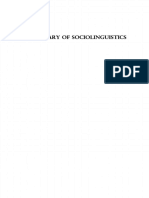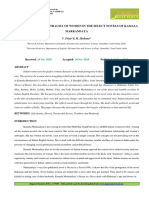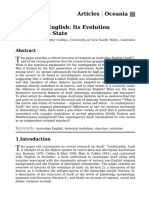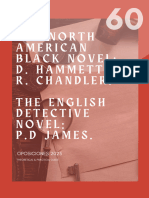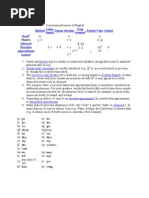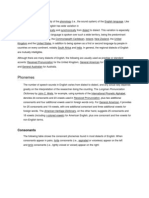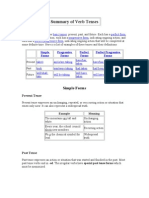Australian Englishpronoun
Australian Englishpronoun
Uploaded by
Gamal HalimCopyright:
Available Formats
Australian Englishpronoun
Australian Englishpronoun
Uploaded by
Gamal HalimOriginal Description:
Copyright
Available Formats
Share this document
Did you find this document useful?
Is this content inappropriate?
Copyright:
Available Formats
Australian Englishpronoun
Australian Englishpronoun
Uploaded by
Gamal HalimCopyright:
Available Formats
AUSTRALIAN ENGLISH AND BRITISH ENGLISH
Main article: Australian English phonology
The primary way in which Australian English is distinctive from other varieties of English is
through its unique pronunciation. It shares most similarity with other Southern
Hemisphereaccents, in particular New Zealand English.
[8]
Like most dialects of English it is
distinguished primarily by its vowel phonology.
[9]
Vowels[edit]
Australian English monophthongs
[10]
Australian English diphthongs
[10]
The vowels of Australian English can be divided according to length. The long vowels, which
include monophthongs and diphthongs, mostly correspond to the tense vowels used in
analyses of Received Pronunciation (RP) as well as its centring diphthongs. The short
vowels, consisting only of monophthongs, correspond to the RP lax vowels. There exist pairs
of long and short vowels with overlapping vowel quality giving Australian English phonemic
length distinction, which is unusual amongst the various dialects of English, though not
unknown elsewhere, such as in regional south-eastern dialects of the UK and eastern
seaboard dialects in the US.
[11]
As with General American and New Zealand English,
the weak-vowel merger is complete in Australian English: unstressed // (sometimes written
as // or //) is merged into // (schwa).
short vowels long vowels
Monophthongs diphthongs
IPA Examples
foot, hood, chook
kit, bid, hid,
e dress, led, head
comma, about, winter
trap, lad, had
a strut, bud, hud
lot, cloth, hot
IPA examples
goose, boo, whod
i fleece, bead, heat
e square, bared, haired
nurse, bird, heard
bag, tan, bad
[nb 1]
a start, palm, bath
[nb 2]
o thought, north, force
[nb 3]
IPA examples
cure, lure, tour
[nb 4]
near, beard, hear
[nb 5]
mouth, bowed, howd
goat, bode, hoed
[nb 6]
face, bait, hade
e price, bite, hide
o choice, boy, oil
1. Jump up^ Historical // has split into two phonemes, one long and one short, so
that, for example, in some parts of Australia bad does not rhyme withlad, while in
others it does, that is to say, lad has the long vowel. However, all Australian regions
distinguish can [kn] "know how to, be able to" from can [kn] "(tin)can, to can
[vegetables, etc.]".
2. Jump up^ Many words historically containing // have /a/ instead, however the
extent to which this development has taken hold varies regionally.
3. Jump up^ o tongue position in o is back, and therefore Australian o has a very
different quality from Scots and Irish o.
[clarification needed]
4. Jump up^ The phoneme // is almost extinct with most speakers consistently
using /./ or // (before /r/) instead.
5. Jump up^ The boundary between monophthongs and diphthongs is somewhat
fluid, //, for example, is commonly realised as [], particularly in closed syllables,
though also found in open syllables such as we're, here, and so on. In open syllables
particularly the pronunciation varies from the bisyllabic [a] though the
diphthong [] to the long vowel [].
6. Jump
Consonants[edit]
There is little variation with respect to the sets of consonants used in various English dialects.
There are, however, variations in how these consonants are used. Australian English is no
exception.
Consonant phonemes of Australian English
[12]
Bilabial
Labio-
dental
Dental Alveolar
Post-
alveolar
Palatal Velar Glottal
Nasal m n
Plosive p b t d k
Affricate t d
Fricative f v s z h
Approximant r j w
Lateral l
Australian English is non-rhotic; in other words, the /r/ sound does not appear at the end of a
syllable or immediately before a consonant. However, a linking /r/ can occur when a word
that has a final <r> in the spelling comes before another word that starts with a vowel.
An intrusive /r/ may similarly be inserted before a vowel in words that do not have <r> in the
spelling in certain environments, namely after the long vowel /o/ and after word final //.
There is some degree of allophonic variation in the alveolar stops. As with North American
English, Intervocalic alveolar flapping is a feature of Australian English:
prevocalic /t/ and /d/surface as the alveolar tap [] after sonorants other than //, /m/as well as
at the end of a word or morpheme before any vowel in the same breath group. For some
speakers /t/ in final or in medial position is glottalised to []. For many speakers, /t/ and /d/ in
the combinations /tr/-/tw/ and /dr/-/dw/ are also palatalised, thus /tr/-/tw/ and /dr/-/dw/, as
Australian /r/ is only very slightly retroflex, the tip remaining below the level of the bottom
teeth in the same position as for /w/; it is also somewhat rounded ("to say 'r' the way
Australians do you need to say 'w' at the same time"), where older English /wr/ and /r/ have
fallen together as /r/. The winewhine merger is complete in Australian English.
Yod-dropping occurs after /r/, /l/, /s/, /z/, //, /t/, /d/, /j/ and //, . Other cases of /sj/ and /zj/,
along with /tj/ and /dj/, have coalesced to //, //, /t/ and /d/ respectively for many
speakers. /j/ is generally retained in other consonant clusters.
Pronunciation[edit]
Differences in stress, weak forms and standard pronunciation of isolated words occur
between Australian English and other forms of English, which while noticeable do not impair
intelligibility.
The affixes -ary, -ery, -ory, -bury, -berry and -mony (seen in words such as necessary,
mulberry and matrimony) can be pronounced either with a full vowel or a schwa. Although
some words like necessary are almost universally pronounced with the full vowel, older
generations of Australians are relatively likely to pronounce these affixes with a schwa while
younger generations are relatively likely to use a full vowel.
Words ending in unstressed -ile derived from Latin adjectives ending in -ilis are pronounced
with a full vowel (/el/), so that fertile rhymes with fur tile rather than turtle.
Variation in the place of articulation of /k/ and //
(i) Before fronted monophthongs such as /i/,//,/e/,/e/ and //, diphthongs with fronted first
targets such as //,// and //, as well as the consonants /j/ and /r/, the velar stop
consonants /k/ and // are fronted to a pre-velar (between palatal and velar) or even a palatal
place of articulation. The pre-velar forms are indicated by placing a under (or over) the
appropriate symbol, ie. [k ] and [
]. The less common palatals are [c] and [] respectively.
/kin/ [k in] (or [cin]) keen
/kjt/ [k t] (or [c t]) cute
/is/ [
is] (or [is]) geese
/rp/ [
p] (or [p]) group
(ii) Before back vowels such as /o/,//,//,//, and //, as well as the semi-vowel /w/, the
velar stop consonants /k/ and // are realised as post-velar stops. The post-velar forms are
indicated by placing a - under (or over) the appropriate symbol, ie. [] and [ ].
/kot/ [ot] caught
/kwet/ [w et] quite
/odi/ [ odi] gaudy
Note that if consonants intervene between /k/ or // and the following vowel then the effect of
that vowel is neutralised and the place of articulation is not changed. However, if /w/, /j/ or //
occur after /k/ or // then they affect the place of articulation of these velar stops, not the
vowel.
Clear and Dark realisations of /l/
(i) Before vowels, diphthongs and /j/, /l/ is realised as [l] (clear 'l'). [] is also usually found at
the end of a word even when the following word starts with a vowel. This articulation clearly
marks the /l/ as belonging to the end of the first word rather than the beginning of the second
word. The following words should be transcribed as follows:
/lif/ [lif] leaf
/lo/ [lo] law
/blk/ [blk] blink
/vlj/ [vlj] value
/mljn/ [mljn] million
/fil/ [fil] feeling
/selt/ [selt] sellout
(ii) Before consonants (except /j/) or a pause (eg. the end of a sentence or utterance), the
allophone is dark (velarised), ie. [], (this is an l with a ~ through it ):
/fil/ [fi] feel
/fild/ [fid ] field
/fil fen/ [fi fen] feel fine
(iii) Syllabic realisations of /l/ are usually dark:
/tbl/ [tb ] table
/mdl/ [m
d ] muddle
(iv) Note however, that the choice of clear or dark /l/ is often dialect specific. For example,
many Australians do use dark /l/ before /j/ in words like value /vlj/ and million
/mljn/ and also before morpheme boundaries like control-able" or "fol-ate". Some even use
it in words like "slowly" and it is almost obligatory in "holy".
Here is a list of the most important types of British English. While this is not a complete list
by any means, it will give you an overview of the accents and dialects most often discussed
on this site and elsewhere.
Received Pronunciation
Received Pronunciation is the closest to a standard accent that has ever existed in the UK.
Although it originally derives from London English, it is non-regional. Youve probably
heard this accent countless times in Jane Austen adaptations, Merchant Ivory films, and
Oscar Wilde plays. It emerged from the 18th- and 19th-Century aristocracy, and has
remained the gold standard ever since.
Features:
Non-rhoticity, meaning the r at the ends of words isnt prounounced (mother sounds
like muhthuh).
Trap-bath split, meaning that certain a words, like bath, cant, and dance are
pronounced with the broad-a in father. (This differs from most American accents, in
which these words are pronounced with the short-a in cat.
The vowels tend to be a bit more conservative than other accents in Southern England, which
have undergone significant vowel shifting over the past century.
Lexical Items
Vocabulary
Australian English is the form of the English language used in Australia.
Australian English is similar in many respects to British English, but there are a few cases
where Australian English is closer to American English. For example: Australian English
uses the American English truck instead of the British English lorry and the American
English freeway instead of British English motorway.
Australian English also incorporates several uniquely Australian terms, such as outback to
refer to remote regional areas, walkabout to refer to a long journey of uncertain length
and bush to refer to native forested areas, but also to regional areas as well. Fair dinkum can
mean are you telling me the truth? this is the truth!, or this is ridiculous! depending on
context.
A substantial collection of unique or unusual words are in common spoken usage - e.g.
"dacks" (trousers), "dag" (unfashionable person), "bludge" (to shirk), "ute" (a utility vehicle
or pickup truck). Another well-known Australianism, "wowser" (a killjoy), has now fallen
out of use. An even larger vocabulary is derived from recognisable words with entirely new
meanings - "to bag" (to criticise), "blue" (either a fight or heated argument, or an
embarrassing mistake), "crook" (unwell, also unfair), "to wag" (to play truant), "cactus" (non-
functional)
Many words used by Australians were at one time used in England but have since fallen out
of usage or changed in meaning there.
For example, creek in Australia, as in North America, means a stream or small river, whereas
in the UK it means a small watercourse flowing into the sea; paddock in Australia means
field, whereas in the UK it means a small enclosure for livestock; bush or scrub in Australia,
as in North America, means a wooded area, whereas in England they are commonly used
only in proper names.
There are words diminutives which commonly used and are often used to indicate familiarity.
Some common examples are arvo (afternoon), barbie (barbecue), smoko (cigarette
break), Aussie (Australian) and pressie(present/gift). This may also be done with people's
names to create nic.knames (other English speaking countries create similar diminutives). For
example, "Gazza" from Gary, or "Smitty" from John Smith.
In informal speech, incomplete comparisons are sometimes used, such as "sweet as" (as in
"That car is sweet as."). "Full", "fully" or "heaps" may precede a word to act as an intensifier.
This was more common in regional Australia and South Australia but has been in common
usage in urban Australia for decades. The suffix "-ly" is sometimes omitted in broader
Australian English. For instance "real good" instead of "really good".
In addition, a number of words in Australian English have different meanings to those
ascribed in other varieties of English. For instance : Pants in Australian English refer to
British English trousers but in British English refer to Australian English underpants; vest in
Australian English refers to British English waistcoat but in British English refers to
Australian English singlet.
Spelling
Australian spelling is closer to British than American spelling. As with British spelling,
the u is retained in words such as colour, honour, labour and favour. While the -our ending
and follows it with the -or ending as an acceptable variant, the latter are rarely found in usage
today. Consistent with British spellings, -re, rather than -er, is the only listed variant in
Australian dictionaries in words such as theatre, centre and manoeuvre. Unlike British
English, which is split between -ise and -ize in words such as organise and realise, with -
ize and -ise listed as a variant, -ize is rare in Australian English. Ae and oe are often
maintained in words such as manoeuvre, paedophilia and foetus (excepting those listed
below).
The DD/MM/YYYY date format is used with Monday as the first day of the week (as with
British practice), however the 12-hour clock is used almost universally (as in the United
States).
Spelling Australian Style
We've put together a sample of English words that are spelled differently by different
countries. Australian and British English are generally identical in the way they spell
words.
These lists are not exact because language is always changing. Although an Australian
word is shown with the British spelling, Australians may use its American version
depending on personal preference or how they were taught in school.
The part of an Australian word that differs from the American version is in red.
Australian
& British American
Australian
& British American
Australian
& British American
ageing
aeroplane
aerofoil
aluminium
arbour
ardour
armour
behaviour
belabour
calibre
centre
cheque
aging
airplane
airfoil
aluminum
arbor
ardor
armor
behavior
belabor
caliber
center
check
gram
harbour
honour
humour
inflexion
jemmy
kerb
labour
licence
gramme
harbor
honor
humor
inflection
jimmy
curb
labor
license
neighbour
nitre
odour
offence
paralyse
parlour
pedlar
potter
practise
pretence
programme
pyjama
neighbor
niter
odor
offense
paralyze
parlor
peddler
putter
practice
pretense
program
pajama
chequer
clamour
colour
defence
deflexion
dolour
draught
enamour
endeavour
favour
fervour
fibre
flavour
fount
furore
checker
clamor
color
defense
deflection
dolor
draft
enamor
endeavor
favor
fervor
fiber
flavor
font
furor
liquorice
litre
lustre
manoeuvre
maths
medallist
metre
millilitre
millimetre
misdemeanour
mitre
mould
moulder
moulding
mouldy
moult
licorice
liter
luster
maneuver
math
medalist
meter
milliliter
millimeter
misdemeanor
miter
mold
molder
molding
moldy
molt
rancour
reflexion
rumour
sabre
sceptre
sepulchre
succour
tyre
vapour
vigour
vocalise
whirr
rancor
reflection
rumor
saber
scepter
sepulcher
succor
tire
vapor
vigor
vocalize
whir
Grammar
Subject-verb agreement
In British English, collective nouns (referring to groups of people) are often followed by a
plural verb even when the noun is singular. This does not occur in Australian English. For
example:
British English: The football team arerather weak this year.
Australian English: The football team is very weak this year.
Other common collective nouns that often take a plural verb in British English are: army,
company, jury, audience, crowd, majority, class, enemy, staff, committee, government and
union.
SOME GRAMMATICAL FEATURES
Question structure
Perhaps one of the most persistent and widespread grammatical features of Aboriginal
English involves the structure of questions. It is common for Aboriginal English speakers to
ask a question using the structure of a statement with rising (question) intonation. This
structure is also used sometimes in colloquial Standard English. It is common for Aboriginal
English questions like this to be finished with a question tag. In much of Australia this tag is
eh?, in South Australia it is inna, and in the south west of Western Australia, it is unna.
Aboriginal English standard English
You still sitting there that time?
You were still sitting there then?
Were you still sitting there then?
They bite, eh? They bite, don't they?
Sentences formed by joining two phrases
One of the most persistent features of Aboriginal English is the expression of equational,
descriptive and locational sentences with the joining of two phrases without adding any
endings or extra words (like the verb 'to be'). This characteristic feature of Aboriginal English
is one which appears not to be shared with other nonstandard varieties of English in
Australia. It also parallels the grammatical structure of Aboriginal languages.
Aboriginal English standard English
E my cousin brother. He's my cousin.
They just normal, but they steel. They're just normal, but they're steel.
My uncle back there. My uncle's back there.
E big. He's big.
Noun Phrase + there
Existential sentences are sometimes expressed with the structure Noun Phrase followed by
there, which translates to standard English 'It's a ... ' (followed by Noun Phrase) or 'there
is/are...' (followed by Noun Phrase).
Aboriginal English standard English
Three pies there, eh? Are there three pies?
When the river go down,
this little island there.
When the river goes down,
there's a little island
Shan't and the use of should as in I should be happy if..., common in upper-register British
English, are almost never encountered in Australian (or North American) English.
While prepositions before days may be omitted in American English, i.e. She resigned
Thursday, they must be retained in Australian English, as in British English: She resigned on
Thursday. Ranges of dates use to, i.e. Monday to Friday, as with British English, rather than
Monday through Friday in American English.
River generally follows the name of the river in question as in North America, i.e. Darling
River, rather than the British convention of coming before the name, e.g. River Thames. Note
in South Australia however, the British convention appliesfor example, the River Murray
or the River Torrens.
When saying or writing out numbers, and is inserted before the tens and units, i.e. one
hundred and sixty-two, as with British practice. However Australians, like Americans, are
more likely to pronounce numbers such as 1200 as twelve hundred, rather than one thousand
two hundred.
In American and Australian English, for example, "sunk" and "shrunk" as past tense forms of
"sink" and "shrink" are beginning to become acceptable as standard forms, whereas standard
British English still insists on "sank" and "shrank".
RESOURCES
Malcolm, I., Haig, Y., Konigsberg, P., Rochecouste, J, Collard, G., Hill, A., & Cahill,
R. (1999a). Two-Way English: Towards More User-Friendly Education for Speakers
of Aboriginal English. Perth: Edith Cowan University.
Malcolm, I., Haig, Y., Konigsberg, P., Rochecouste, J, Collard, G., Hill, A., & Cahill,
R. (1999b). Towards More User-Friendly Education for Speakers of Aboriginal
English. Perth: Edith Cowan University.
Western Australia, Department of Education (1999). Solid English.
[These three Western Australian books report on research on Aboriginal English,
and provide guidelines and practical suggestions for teachers.]
Deadly eh, Cuz: Teaching Speakers of Koorie English. Goulburn Valley Aboriginal
Education Consultative Group Incorporated. Shepparton, Victoria.
[A kit for teachers of Aboriginal English speaking students in Victoria.]
NSW Early Childhood Aboriginal Literacy Resource Kit. Sydney: Board of Studies
[A kit for teachers of young Aboriginal English speaking students in New South
Wales.]
You might also like
- The Lamp at NoonDocument3 pagesThe Lamp at NoonRobin BraconnierNo ratings yet
- Satire and Crit EssayDocument74 pagesSatire and Crit Essaytrances scriptNo ratings yet
- Poetry of Nationalism During World War IDocument4 pagesPoetry of Nationalism During World War ICaseyNo ratings yet
- The French Lieutenant S Woman by John FowlesDocument9 pagesThe French Lieutenant S Woman by John FowlesGianina LeutuNo ratings yet
- David LodgeDocument18 pagesDavid LodgeMihaela IulianaNo ratings yet
- Review of Jhumpa Lahiri's 'Unaccustomed Earth'Document3 pagesReview of Jhumpa Lahiri's 'Unaccustomed Earth'Sonal ShreeNo ratings yet
- Everyman and Medieval Miracle Plays PDFDocument2 pagesEveryman and Medieval Miracle Plays PDFMartha0% (1)
- Attitudes To Australian EnglishDocument1 pageAttitudes To Australian EnglishloveethescriptNo ratings yet
- Australian EnglishDocument14 pagesAustralian EnglishИлона ДейнекоNo ratings yet
- Literary TermsDocument9 pagesLiterary TermsBrince MathewsNo ratings yet
- Peter Trudgill - A Glossary of Sociolinguistics-Edinburgh University Press (2022)Document176 pagesPeter Trudgill - A Glossary of Sociolinguistics-Edinburgh University Press (2022)Ansuman Mishra100% (1)
- Hybridity and National Identity in Postcolonial Literature Annotated BibliographyDocument6 pagesHybridity and National Identity in Postcolonial Literature Annotated BibliographysupratimloveNo ratings yet
- Phonetic Differences Between British and Australian EnglishDocument3 pagesPhonetic Differences Between British and Australian EnglishМАРИНАNo ratings yet
- Standard English and Its DialectsDocument3 pagesStandard English and Its DialectsCatalinaNo ratings yet
- Australian EnglishDocument10 pagesAustralian EnglishmizmarijaNo ratings yet
- An Unwritten Novel STUDY GUIDEDocument5 pagesAn Unwritten Novel STUDY GUIDELauraNo ratings yet
- Shakespeare's LanguageDocument12 pagesShakespeare's Languageʚϊɞ Sarah Omar ʚϊɞNo ratings yet
- Philip LarkinDocument15 pagesPhilip LarkinSumaira MalikNo ratings yet
- Basic Concepts of Modern Linguistics: Language Et ParoleDocument9 pagesBasic Concepts of Modern Linguistics: Language Et Parolemuneeba khanNo ratings yet
- Paper 9 (2019.2.6) The Themes of Attachment and Love in Jane Austen's Emma A Critical StudyDocument6 pagesPaper 9 (2019.2.6) The Themes of Attachment and Love in Jane Austen's Emma A Critical StudyInternational Journal of Linguistics, Literature and TranslationNo ratings yet
- The Impact of The First World War On The Poetry of Wilfred OwenDocument16 pagesThe Impact of The First World War On The Poetry of Wilfred OwenmanalotaibiNo ratings yet
- Vocabulary For Literary AnalysisDocument36 pagesVocabulary For Literary AnalysisBranka ArrivéNo ratings yet
- The Striking Sustainability of Literary RealismDocument51 pagesThe Striking Sustainability of Literary RealismGeram Glenn Felicidario Lompon100% (1)
- Warsztat Tłumacza II: DR Ewa RajewskaDocument11 pagesWarsztat Tłumacza II: DR Ewa Rajewskariazurrehman100% (2)
- Gerard Genette's Evolving Narrative PoliticsDocument12 pagesGerard Genette's Evolving Narrative PoliticsMatthijs SorgdragerNo ratings yet
- EmmaDocument3 pagesEmmaDeepthi SiriwardenaNo ratings yet
- Character and Voice in The Poetry of Browning: Sydney StudiesDocument18 pagesCharacter and Voice in The Poetry of Browning: Sydney StudiesishikaNo ratings yet
- Poetic DevicesDocument8 pagesPoetic Devicesapi-53798025No ratings yet
- Poetry Analysis Wilfred OwenDocument2 pagesPoetry Analysis Wilfred OwenCindy ReisNo ratings yet
- Essay Moll FlandersDocument1 pageEssay Moll FlandersDenisse EcheverriaNo ratings yet
- The Snows of KilimanjaroDocument19 pagesThe Snows of KilimanjaroMacrina CasianaNo ratings yet
- Eating Babies Proposal Effect-An Analysis of A Modest ProposalDocument9 pagesEating Babies Proposal Effect-An Analysis of A Modest Proposalapi-608294837No ratings yet
- The Love Song of J. Alfred PrufrockDocument3 pagesThe Love Song of J. Alfred PrufrockAlexandra CampeanuNo ratings yet
- Poetry For SoldiersDocument16 pagesPoetry For Soldiershelmuth zieglerNo ratings yet
- Classic British and American Essays and SpeechesDocument9 pagesClassic British and American Essays and SpeechesIndie BotNo ratings yet
- Social Satire and Anarchist Themes in DaDocument10 pagesSocial Satire and Anarchist Themes in DaSofiya WilliamsNo ratings yet
- RP Vs AmE and Stress RulesDocument11 pagesRP Vs AmE and Stress RulesMoustacheDecoNo ratings yet
- Silas MarnerDocument152 pagesSilas MarnerSolange Ramirez100% (3)
- British Poetry of The Great WarDocument5 pagesBritish Poetry of The Great WarMarta Garcia GonzalezNo ratings yet
- The University WitsDocument19 pagesThe University WitsdavestaNo ratings yet
- Handout - SurEngLit I - Part IDocument43 pagesHandout - SurEngLit I - Part IMarija JeramazNo ratings yet
- Features of Epic PoetryDocument8 pagesFeatures of Epic PoetryMarija2803No ratings yet
- The Summoning of EVERYMANDocument16 pagesThe Summoning of EVERYMANRuth Jasmin BadaNo ratings yet
- "'A MODEST PROPOSAL' Is An Ironical Essay."-Would It Be Possible To Read This Essay As A Serious One?Document3 pages"'A MODEST PROPOSAL' Is An Ironical Essay."-Would It Be Possible To Read This Essay As A Serious One?Hannah DYNo ratings yet
- The Psychological Trauma of Women in The Select Novels of Kamala Markandaya-2018-11!24!12-14Document4 pagesThe Psychological Trauma of Women in The Select Novels of Kamala Markandaya-2018-11!24!12-14Impact JournalsNo ratings yet
- The Poetics Aristotle HandoutDocument4 pagesThe Poetics Aristotle HandoutCrumpets Halstead100% (1)
- Australian English PDFDocument12 pagesAustralian English PDFNatalia RusuNo ratings yet
- Archaic Grammmar EnglishDocument447 pagesArchaic Grammmar EnglishPiyush SarangiNo ratings yet
- Moby DickDocument1 pageMoby Dickkriskee13No ratings yet
- Metaphor Aristotle Tragedy Term: Catharsis, The Purification or Purgation of The Emotions (EspeciallyDocument6 pagesMetaphor Aristotle Tragedy Term: Catharsis, The Purification or Purgation of The Emotions (Especiallyshila yohannanNo ratings yet
- The Elements of PoetryDocument8 pagesThe Elements of PoetryRubab ChaudharyNo ratings yet
- Lorna Sage - Angela Carter The Fairy TaleDocument19 pagesLorna Sage - Angela Carter The Fairy Talebubagialla100% (2)
- AssignmentDocument4 pagesAssignmentDivya KhasaNo ratings yet
- The North-American Black Novel: D. Hammett, R. Chandler The English Detective Novel: P.D. JamesDocument16 pagesThe North-American Black Novel: D. Hammett, R. Chandler The English Detective Novel: P.D. JamesArdnas AtsocNo ratings yet
- Macdougall Whose HistoryDocument9 pagesMacdougall Whose HistoryMoures N'DombeNo ratings yet
- The Novel in Africa and The CaribbeanDocument61 pagesThe Novel in Africa and The Caribbeanfm1No ratings yet
- Narrative Theory Meets Blending: Multiperspectivity ReconsideredDocument13 pagesNarrative Theory Meets Blending: Multiperspectivity ReconsideredJay- Ar MantesNo ratings yet
- Realistic Vs Romantic: The Imagistic World of Post-War English LiteratureDocument25 pagesRealistic Vs Romantic: The Imagistic World of Post-War English LiteratureShahpar AltafNo ratings yet
- Consonant Phonemes of EnglishDocument15 pagesConsonant Phonemes of Englishkinweng8209No ratings yet
- Phonemes: English Phonology Is The Study of The Phonology (I.e., The Sound System) of The English Language. LikeDocument19 pagesPhonemes: English Phonology Is The Study of The Phonology (I.e., The Sound System) of The English Language. LikeSkill ××No ratings yet
- Test Paper Clasa V Bilingv UNIT 2Document2 pagesTest Paper Clasa V Bilingv UNIT 2Eliana FrigioiuNo ratings yet
- IdiolectDocument3 pagesIdiolectsadiqmazariNo ratings yet
- New Inspiration Plurilingual Worksheet Level 3 Unit 1Document2 pagesNew Inspiration Plurilingual Worksheet Level 3 Unit 1eya ferjaniNo ratings yet
- Summative Test 3rd GradingDocument1 pageSummative Test 3rd GradingKyle Regalia100% (1)
- Direct and Indirect Speech in English GrammarDocument5 pagesDirect and Indirect Speech in English Grammarradhikachopda239No ratings yet
- Grammar Revision 1 3rd TermDocument3 pagesGrammar Revision 1 3rd Termlpa_20No ratings yet
- Materi Bahasa Inggris Kelas Xi Semester 1Document3 pagesMateri Bahasa Inggris Kelas Xi Semester 1Umiyatul Arifah100% (1)
- Simple Compound ComplexDocument2 pagesSimple Compound Complexapi-440624658No ratings yet
- Legend of OlongapoDocument5 pagesLegend of OlongapoMay Joie Jayme0% (1)
- Lorem Dummy 2 NONESENSEDocument1 pageLorem Dummy 2 NONESENSEcusasNo ratings yet
- Characteristics of LanguageDocument2 pagesCharacteristics of LanguageKoledoye Ikuelogbon Akinwumi Kehinde100% (1)
- About Me PDFDocument2 pagesAbout Me PDFPeregély Anna100% (1)
- L2 - Adverb of MannerDocument9 pagesL2 - Adverb of MannerArlene AnocheNo ratings yet
- Pashto Alphabet PDFDocument1 pagePashto Alphabet PDFMuhammad Ali KhanNo ratings yet
- Pronoun: Personal Subjective Objective Possessive Adjective Possessive Pronoun MeaningDocument3 pagesPronoun: Personal Subjective Objective Possessive Adjective Possessive Pronoun MeaningNeni ChandraNo ratings yet
- 80/20 Japanese: 10 Steps To 500 SentencesDocument13 pages80/20 Japanese: 10 Steps To 500 SentencesBaudelio MuroNo ratings yet
- English Homework For Year 5Document11 pagesEnglish Homework For Year 5Sophia Sindun100% (1)
- Open Mind Elementary Unit 02 Grammar 2Document12 pagesOpen Mind Elementary Unit 02 Grammar 2khatuna sharashidzeNo ratings yet
- 8 Parts of Speech Grammar Guides - 45019Document1 page8 Parts of Speech Grammar Guides - 45019DIEGO ALONSO RESTREPO BERRIONo ratings yet
- World English - TrabalhoDocument6 pagesWorld English - TrabalhoPriscila AlineNo ratings yet
- RussianAlphabetGuide 1 12-1-1 PDFDocument6 pagesRussianAlphabetGuide 1 12-1-1 PDFAndres SalcedNo ratings yet
- Parts of Speech Classwork 2Document2 pagesParts of Speech Classwork 2Danny VillamourNo ratings yet
- GI A1PLUS U4 Grammar HigherDocument1 pageGI A1PLUS U4 Grammar HigherMiluskhaNo ratings yet
- Module 3 - Passive VoiceDocument6 pagesModule 3 - Passive VoiceNissa FebrianiNo ratings yet
- Past Perfect TenseDocument3 pagesPast Perfect Tenseapi-304729893No ratings yet
- Defining and Non-Defining Relative ClausesDocument6 pagesDefining and Non-Defining Relative ClausesRolando ValenciaNo ratings yet
- A Comprehensive Russian Grammar, Third Edition - Learn Russian (PDFDrive) Part-55Document10 pagesA Comprehensive Russian Grammar, Third Edition - Learn Russian (PDFDrive) Part-55NameNo ratings yet
- Tarea 5 InglesDocument4 pagesTarea 5 InglesmariNo ratings yet
- WORD-STRUCTURE - 2 - Types of Word-SegmentabilityDocument2 pagesWORD-STRUCTURE - 2 - Types of Word-SegmentabilityШапагат БаймуратоваNo ratings yet
- Summary of Verb TensesDocument4 pagesSummary of Verb TensesMayur RawoolNo ratings yet










